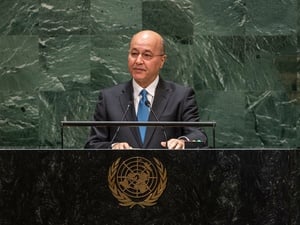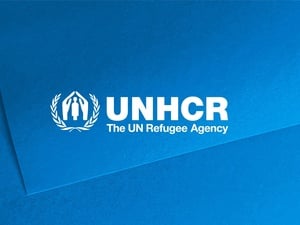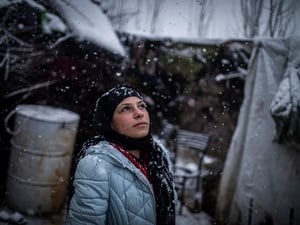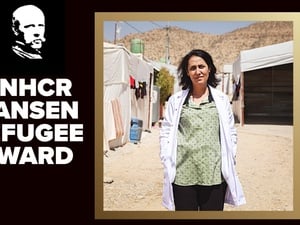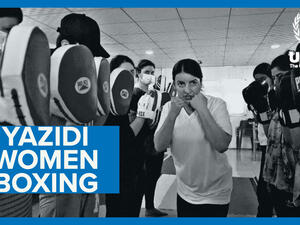Iraq receives, and repatriates, long-time refugees
Iraq receives, and repatriates, long-time refugees

An earlier group of Iraqi returnees from Saudi Arabia's Rafha camp.
BAGHDAD, Jan 6 (UNHCR) - More than 600 long-time Iraqi refugees have repatriated in the last two days after clamouring for months to be assisted home from their camps, while 15 Turks opted to end their exile in northern Iraq and go back to their homeland.
For the last six months, UNHCR has facilitated the return of small numbers of Iraqi refugees who told the agency they were desperate to return despite the uncertain security situation and the often difficult living conditions back home.
A convoy carrying 330 refugees arrived today in southern Iraq from Saudi Arabia's Rafha refugee camp. The convoy of eight buses and 12 trucks was the 14th group of Iraqis to leave Rafha since UNHCR's facilitated repatriation convoys started in July 2003. The Iraqis had lived in Rafha for nearly 13 years after fleeing their homeland at the end of the 1991 Gulf War.
The returning refugees transited Kuwait in the early hours of the morning, arriving in Iraq at sunrise. According to UNHCR staff, the group was overjoyed to be finally back in Iraq after being delayed for two weeks at the Ar Raq'i pilgrimage camp on Saudi Arabia's northern border due to security concerns.
Coalition Provisional Authority (CPA) workers met the convoy at the frontier and escorted the Iraqis into Basra, where local workers from the UN refugee agency received them at a transit centre and distributed a month's supply of food aid and other items like blankets, plastic sheeting, jerry cans and soap.
UNHCR-facilitated returns from Saudi Arabia have so far helped some 4,500 refugees to go back to Iraq.
On Monday, some 300 Iraqis also returned from Iran's Motahari and Ansar refugee camps in south-western Khuzestan province. Some of them had been living in exile for more than two decades, since the Iran-Iraq war.
Before entering Iraq, the returning refugees underwent mine-awareness training and other departure formalities at the Shalamcheh border crossing. Security concerns had delayed the departure of this convoy as well. A shortage of trucks due to the massive recovery effort following the recent earthquake in Bam also hindered the start of this year's repatriation convoys from Iran.
Like the returnees from Rafha, they were received on the Iraqi side by CPA personnel and escorted into Basra, where UNHCR staff distributed assistance as well as tents to those needing them. All the returning refugees are also enrolled in Iraq's country-wide food distribution system.
This was the fourth convoy of Iraqi refugees to leave Iran since facilitated returns started in late November. To date, more than 800 Iraqis have returned from Iran on four UNHCR-facilitated convoys.
The UN refugee agency is not encouraging anyone to go back to Iraq, only facilitating the repatriation of those people who actively seek to go back regardless of conditions inside the country and the continued absence of international UNHCR staff to monitor their welfare upon their return.
Also today, 15 Turkish refugees returned to Turkey from northern Iraq when a convoy consisting of a minibus and two trucks brought them to the Habur gate on the Turkish-Iraqi border.
The refugees had been settled in northern Iraq's Dohuk province for 10 years. This voluntary repatriation was facilitated by UNHCR, and the group was registered on return by Turkish officials and UNHCR. The refugee agency provided the returnees with hot meals at the border, and offered transportation to their villages of origin for those persons who were not met by relatives.
This latest movement brings the total number of Turkish refugees to return from Iraq with UNHCR help to 2,241 people since 1998.
Turkish refugees make up Iraq's third-largest refugee population. More than 9,000 live in Makhmour refugee camp in Ninawa governorate, south-west of Erbil. Another estimated 3,700 Turkish refugees are locally integrated in northern Iraq's Dohuk and Erbil governorates. The majority of these refugees started arriving in Iraq in the early 1990s.


